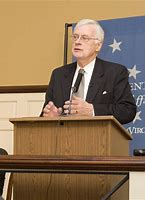In devastated post-war Europe, millions of people were qualified and eager for jobs or desperate for capital to get their farms planted and harvested. In demographically-diminishing rural Virginia, farms are mechanized. If you build a huge factory today qualified workers may not come in sufficient numbers.
A scaled-down 21st Century Marshall Plan is a nice rhetorical image, and former Governor Gerald Baliles captured the headlines by using it in a recent speech, but the analogy simply doesn’t fit. Rural Virginia’s problems cannot be fixed with an infusion of cash.
When Baliles has something serious to say, serious Virginians should read or listen. After successful turns as legislator, attorney general and governor (pestered but never tripped by the loyal opposition) he returned to private life and never again appeared on the ballot. That alone sets him apart from today’s career politicians. He has had a long-standing focus on his native rural Virginia, but his legal career was Main Street Richmond.
“If you were to take the “rural horseshoe” and hold it up against the Golden Crescent, the contrasts are stunning. Two Virginias! Moreover, according to our community college system officials, if the “rural horseshoe” region were considered a separate state, it would be tied for dead last with Mississippi and West Virginia for educational attainment levels—dead last for citizens with high school diplomas; dead last for citizens with college degrees. Think about that.”
His emphasis on education goes back to his own life experience and that of so many others, my mother’s Southwest Virginia family included. His critique of Virginia’s failure to hold down higher education costs and provide a high enough share from taxpayer funding is spot on. As the brisk Bacon’s Rebellion discussions on Richmond’s challenged schools illustrate, however, there are more than two Virginia’s.
The real headline in his talk was the discussion of the Virginia Tobacco Commission’s efforts and the poor results after so many bright ideas, so many grants, and so much money. I remember the birth of that idea in the Office of the Attorney General under Mark Earley, Randolph Beales, Jerry Kilgore and then Judith W. Jadgmann – three of them with rural roots. I signed for the first electronic transfer of tobacco settlement funds and the number of zeros made me woozy.
“Arguably, with some exceptions, such as Danville, the rural region of Southside and Southwest Virginia is in worse shape today than 20 years ago when the Tobacco Commission had more than $2 billion to “transform” the region as the legislation required. Look at the educational attainment levels,” Baliles said in his recent speech to the State Council of Higher Education for Virginia (SCHEV). Again, spot on.
Baliles’ idea to focus remaining tobacco settlement funds on educational attainment is a good one, but he also has his eyes on the burst of higher state tax revenue that will result when Virginia conforms to recent federal tax changes. Never has so little money been earmarked by so many people for so many pet projects: the earned income tax credit are K-12 school construction and reconstruction top a growing list. (More on that tomorrow.)
Rural Virginia, designated by that rough U-shaped ring of relative poverty around the corridors of wealth, has educational assets. Baliles notes that 14 of the 23 community colleges are located there, but they are the smaller ones. Their doors are not battered by more applicants then they can handle, in most cases. Virginia Tech, Radford and Longwood are state universities in the footprint, and the powerful New River Valley economy is fueled by the first two.
The problem is that young people get what education they do and then leave for the bright lights and the land of Uber. Or they leave to get that next level of education. For any number of reasons, once they have the opportunity they simply do not stay in sufficient numbers to become a magnet for high tech or advanced manufacturing jobs in great numbers. Many who stay lack that educational attainment and the opportunity it brings.
I cannot think of any policy, any economic development strategy, any spending plan coming out of the General Assembly that will change this pattern.



